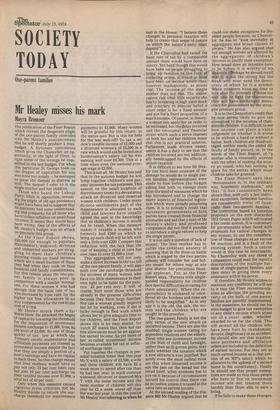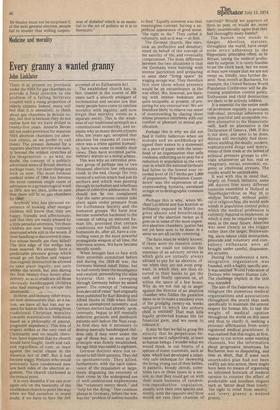Spectator opecLator July 13 1974
SOCIETY TODAY
One-parent families
Mr Healey misses his mark
Moyra Bremner
The publication of the Finer Report which reveals the desperate plight of the one-parent family coincided with Mr Healey's announcement, that he will shortly produce a mini budget. A fortunate coincidence
which gives the Chancellor an opportunity, in the light of Finer, to right some of the wrongs he Corn
mined in the last budget. For when this particular St George took on the dragon of capitalism his aim was none too steady — he managed to spear the damsel in distress as well. The damsel I refer to is the single mother and her children. Those who heard the Labour Party, while in opposition, lamenting the plight of old age pensioners might have been led to suppose that its ministers had some understanding and sympathy for all those who have to face inflation on small fixed incomes, It seems they would have been wrong. One of the effects of Mr Healey's budget was an attack on precisely this group. As the Finer Report shows, 520,000 (or enough to populate Manchester), widowed, divorced and unmarried mothers are struggling to meet their children's growing needs on fixed incomes Which are a small fraction of those they had when they took on their financial and family commitments. For this reason alone the one-parent family is always poor in comparison with a similar 'normal' one. For these women it was bad enough that the basic rate of tax was increased by 3 per cent, for the higher tax free allowances in no way compensated for the rise in the cost of living. Mr Healey struck them a far worse blow. He attacked the bogey of capital by lowering the threshold for the imposition of investment income surcharge to £1,000, from its old level of £2,000. By one of those quirks of tax law at which the Treasury excels, maintenance and affiliation payments are classed as investment income despite the fact that they are simply a portion of a man's earnings and have no capital to back them. So this change meant that lone mothers would have to pay not only 33 per cent basic rate but also 10 per cent surcharge on their taxable income over £1,000, a total tax of 43 per cent. Only when this measure caused vigorous press criticism did Mr Healey decide to return the .surcharge threshold for maintenance payments to £2,000. Many women will be grateful for this return to the status quo. But is this his help for the less well-off? To tax a widow's taxable income of £1,000 and a divorced woman's of £2,000 at a rate which would not be levied on a businessman's salary till he was earning well over £4,500. This at a time when even the national average wage is £2,000. This is not all, Mr Healey has said that in the autumn budget he will lump together children's and parents' incomes for tax purposes. This assault on the small loophole of discretionary trusts is a devastating attack on divorced and deserted. women with children. Under many divorce settlements part of the maintenance is allocated to each child and lawyers have usually agreed the sum in the knowledge that as children's income it would not be taxed. When this measure makes it taxable a woman who formerly had £300 on which to bring up each child will be left with only a little over £200. Compare this reduction with the fact that the cost of keeping a child in care has now risen to over £1,800 a year.
This aggregation will not only make a direct increase in the tax bill of the one-parent family, it will also push over the surcharge threshold the incomes of many women who have too little maintenance in their own right to be liable for the punitive 43 per cent levy. It will, of course, hurt most those who are already in the greatest difficulties because they have large families. Nor can a woman greatly improve her lot by working, even if she is lucky enough to find work which allows her to give adequite time to her children, and the Finer Report shows this is no easy matter, for 'catch 22' states that then her tax free allowances must be set against her earned income. So yet more of her so-called investment income becomes available for tax at inflated surcharge rates.
Put together the changes in personal taxation mean that this year Mr X with a salary of £2,500, a wife and three children will have £2 a week more to spend after tax than he had last year: in stark contrast widowed, divorced or deserted Mrs Y with the same income and the same number of children will this year be £2 a week worse off than she was last year. Is this the justice Mr Healey was referring to when he said in the House: "I believe the-se changes in personal taxation will
help to create that sense of justice on which the nation's unity must depend"?
If the Chancellor had raised the basic rate of tax by a comparable amount there would have been an outcry. Yet hard though this would have been on people struggling to bring up families in the face of rocketing prices, it would at least have been on income which rises, however inadequately, as prices rise. The income of the single mother does not rise. The widow cannot risk what little security she has by investing in high yield stock and contrary to popular belief a court order is for a fixed amount and not for a fixed proportion of a man's income. Of course, in theory, a woman can apply for an order to be increased, but the delay involved and the emotional and financial strain which such a move imposes on both her and her children mean that this is not practical solution. Parliament made divorce easier; surely it has a duty to see that the children involved are not additionally handicapped by the effects of unjust taxation.
It is difficult to see how Mr Healey can have been unaware of the damage he would do to single parent families: representations were made to him before the budget asking him both to exempt them from the kind of measures which he has introduced and to change the many aspects of financial legislation which were already penalising them. It is to nobody's credit that successive governments of both parties have created these financial anomalies and sad that a man of Mr Healey's ability and professed compassion did not find it possible to introduce a single reform to help the single parent. It is not only a question of lack of money. The lone mother has to suffer the constant anxiety of knowing that in the them-us battle which is waged by the two parties nobody will consider her and bullets meant for others may at any time shatter her precarious financial applecart. For, as the Finer Report says, "Parents with singlehanded responsibility for children face special difficulties in caring for them adequately. When the responsibility is unshared or unrelieved all the burdens and risks are likely to be magnified." As in any war it is the old, the sick, the women and the children who are caught in the crossfire.
The one-parent family is not the only victim of the new attack on unearned income. There are also the disabled, single women caring for dependent relatives and the elderly. Those who see investment income as the fruit of thrift and foresight, rather than as ill-gotten gains, may doubt whether the taxation which it now attracts is ever justified. But surely even the most radical must see that when unearned income is not the jam on the bread but the bread itself, when someone has to live on it because of circumstances beyond his control then there can be no justice unless it is taxed at the same rate as earned income.
At the second reading of the Finance Bill Mr Healey argued that he
could not make exceptions for disabled people because, as Chancel: lor, he has to "look inevitably at aggregates and broad classes of people," He has also argued that
not enough women are affected by the aggregation of children's incomes to justify their exemption.
How broad does an injustice have to be before it is worthy of his attention? Perhaps he should recall that it is not the strong but the weak who Most need the demo cracy of which he is a symbol.
When ministers have no time to look after the interests of those not well able to fight for themselves, they will have exchanged democracy for government by the strongest pressure group.
It is to the Chancellor's credit that he now seems likely to give tax exemption to the incomes of thali domide children. It is difficult to see how anyone can place a value judgement on whether it is worse to be without a hand or without a father, both children are disadvantaged; neither needs the added difficulty of family penury, or, in the words of the Finer Report, of "a mother who is constantly worried with the effort of making the money go round, who has nothing to spare for the extras which most children take for granted."
The Finer Report says that "maintenance is, in the ordinary way, hopelessly inadequate," and that "it has consistently been shown that, with only a few individual exceptions, fatherless families are considerably worse off financially than two-parent families." The commjttee based its taxation proposals on the now discarded 1972 Green Paper which advocated a tax credit system. It is customary for governments when faced with proposals for radical changes in any system, to use the consideration of these changes as an excuse for inaction, and is a fault of the existing system. Such a course would in this case be inexcusable. No Chancellor with any shred of compassion could read the report's descriptions of the multiple burdens of single-parent families and then delay in giving them every assistance within his power.
If, therefore, Mr Healey wishes to maintain any credibility he will see to it that the Finer recommendations to alleviate the grinding poverty of the bulk of one-parent families are speedily implemented. In the meantime, he should use his mini-budget to give tax exemption to any child's income which arises out of a court order, whether awarded to or for the child. This will protect all the children who have been hurt by thalidomide, divorce, illegitimacy or an accident. He should also see that maintenance payments and affiliation orders are included in the definition of earned income. For they are as much earned income as is that portion of an MP's salary which he allocates to the upkeep of a second home in his constituency. Finally he should see that proper exemptions are made so that those people who have to live on investment income are not treated more harshly than those able to earn a living.
If he fails to make these changes, Mr Healey must not be surprised if, at the next general election, people fail to muster that willing suspen sion of disbelief which is as essential to the art of politics as it is to literature.



































 Previous page
Previous page